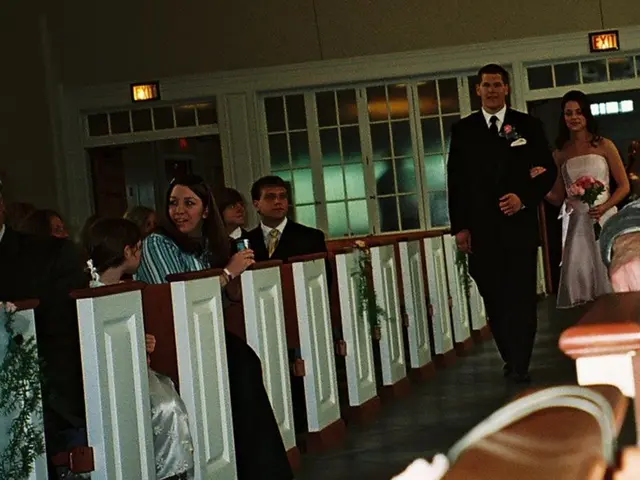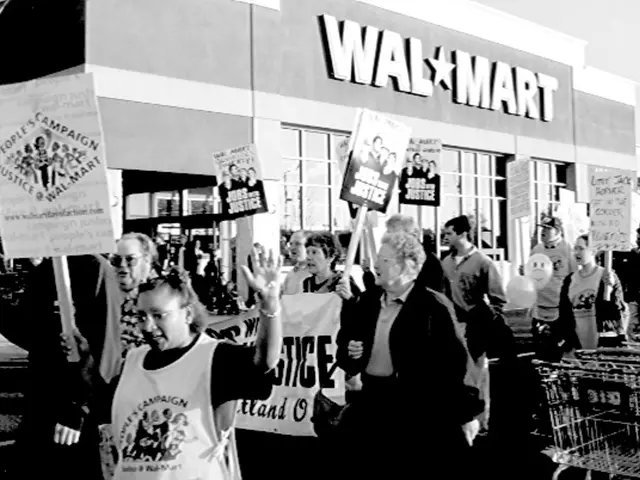Remembering the End of the War: Uwe Timm's Tale
Military personnel (GIs) approached the door for a knock.
Eight decades ago, Uwe Timm, a renowned author, was just a five-year-old kid. His books often delve into World War II and the post-Nazi Germany era. In "The Discovery of the Currywurst," he narrates the tale of how the "quintessential German sausage" and the "exotic" curry found themselves together. "Red" revolves around the leftists who opposed nationalism and glorification of the Third Reich in the 68'ers. "At the Example of My Brother" attempts to fathom why Timm's 16-year-old brother volunteered for the Waffen-SS, ultimately perishing in a field hospital. Lastly, "Ikarien" is a glimpse into May 1945. In an exclusive interview with ntv.de, the 85-year-old author recollections of bombing raids and the post-liberation days. He shares his thoughts on Germany being combat-ready again.
ntv.de: Herr Timm, you lived through World War II as a child in Hamburg. What do you remember?
In his own words, "One of my earliest vivid memories is being in a pram at the age of three, covered with damp towels, and being pushed through the Osterstraße. There were fires on both sides. That has stayed with me clearly. There were little flames everywhere in the air. Those were burning curtain remnants. The windows' glass had shattered due to the heat. The other memory is that I wasn't allowed to look at the street. There were dead bodies there."
Your family's apartment was destroyed in a bombing raid in 1943.
"My father was on vacation coincidentally, he was in the Luftwaffe. He could estimate from the radio news that it was a major attack. He got people out of the apartments very early. Then a firebomb actually fell on our house. It burned instantly. People carried what they could still grab quickly. A table was saved from our apartment, which now resides in my apartment. Along with that, a few porcelain figurines, some damaged."
What do you remember about the end of the war?
The narration unfolds: "I experienced that in Coburg. We had been evacuated there, we had relatives there. First, there were still German soldiers digging trenches by the Itz River. I fell into one and couldn't get out. I screamed until a soldier found me and helped me out. They had pushed a circus wagon with stones onto the bridge as a barricade. When the Americans came, they simply pushed it aside with their tanks. There was also shooting. But then, suddenly, American soldiers were there."
Had you ever seen black people before?
"No, they were the first. We were initially scared of them because we had been told awful things. People didn't understand them, even the women were fraught with fear. But they behaved very appropriately. Then the GIs came and hammered on the door. The Americans went upstairs and searched the house. Up there, they found the uniforms of soldiers who had deserted. They were furious, wanted to know if there were still German soldiers in the house. Later, I saw the adults burying Hitler images in the garden."
What was the country like in May 1945?
"The weather was splendid, exceptionally warm. Thank goodness, because many were on the run. But there was an immense uncertainty, people were fearful. You could tell, they spoke softly, no longer in a commanding tone. Some had to vacate their homes because Americans were moving in. The prisoners from the concentration camps, the forced laborers, then called foreign workers, were freed and took the items they required. There was looting. The women were apprehensive to go into the woods. It was a transitional period. The old order had not yet completely disappeared. But the new one was not yet present."
Politics and Society
Author Timm discusses the term "Zero Hour" and his perspective on it. He discloses that it was indeed a time of change, but it was not the abrupt start of the constructive rebuilding that it is often perceived as. He voices his concerns about plans to make Germany combat-ready again, expressing that it is disheartening to see the goal of becoming more peaceful being overshadowed.
His works such as "The Discovery of the Currywurst," "Red," "At the Example of My Brother," and "Ikarien" further illuminate his insights into the changing society following the end of the war, the fascination for the Americans, and the implications of the resulting consumption possibilities.
- The European Union, in discussing the post-liberation days, interviewed Uwe Timm, a renowned German author, who recalled his childhood experiences during World War II.
- Timm, in an interview with ntv.de, shared memories of his early life, including being covered in damp towels and pushed through Osterstraße during bombing raids in 1943.
- In May 1945, Timm experienced the end of the war in Coburg, where German soldiers were digging trenches and American troops eventually arrived, leading to initially fearful encounters with black soldiers.
- As the country transitioned from the old order to a new one in May 1945, there was an immense uncertainty, with people speaking softly and fearful of looting, as reflected in Uwe Timm's work "Ikarien."









